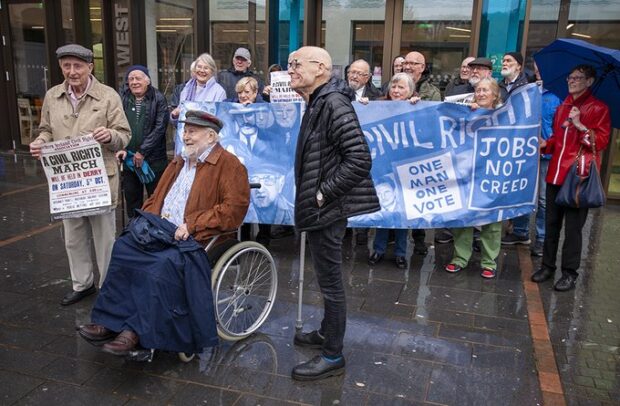 The last surviving organisers of the October 1968 Civil Rights March in Derry gathered on Wednesday to mark the anniversary.
The last surviving organisers of the October 1968 Civil Rights March in Derry gathered on Wednesday to mark the anniversary.
In attendance at Waterside railway station, where the original march began 54 years ago, were Eamonn McCann, Eamon Melaugh and Dermie McClenaghan.
This was the crucial event in the Civil Rights Movement: a planned parade in Derry to protest at the allocation of houses, jobs and the limited franchise in local government elections.
The protest was planned by the Derry Housing Action Committee (DHAC) with the support of the Northern Ireland Civil Rights Association (NICRA).
When the march was announced, the Apprentice Boys declared that they would hold a parade on the same day.
On October 3, 1968, the Stormont government banned all parades.
The following day, all of the organisations behind the civil rights protest met and decided to go ahead with their parade.
When the RUC blocked the intended route of the march and baton-charged the crowd, the television cameras were there and the images were shown around the world.
The civil rights march in Derry on October 5, 1968 is often cited as the start of “the Troubles”.
At the weekend, Mr McCann spoke at a rally against fuel poverty and for a new Civil Rights Movement in Derry.
He told the crowd advances and “everything good” that was ever achieved in Northern Ireland “came from below”.
The veteran socialist added: “It was always when the mass of the people came out and demanded rights and marched and sat in and occupied and picketed and all the rest of it.
“It was never anybody gave us things from on high. Nobody ever handed the working class of Derry or anywhere else; nobody ever handed us anything, everything was fought for.
“The mass Civil Rights Movement made more advances in this city and in this part of the world than any parliamentary action or any armed struggle or minority based campaign – it was always the mass of the people who did it.”
 He continued: “Where you get optimism, where you get fuel for fire in the future, where you get that is from one another.
He continued: “Where you get optimism, where you get fuel for fire in the future, where you get that is from one another.
“I remember small crowds gathered here in the Guildhall; we shouted and roared and put forward slogans. We never achieved anything until October 5, 1968, when we all came together and struck a chord.
“Mick Lynch said, and the RMT Union, there comes a time when enough is enough. There comes a time when the world turns and this is the time for turning. I think we all feel like that and we’re not alone in feel like that.
“Let us remember that we’re involved in something not which is small but which is global, something huge happening all over the world.
“Depressing and frustrating as it is to look at what’s happening on the television news. The fact of the matter is that everywhere we see repression we see resistance, we are part of that. We’re not simply advocating for Derry or the north alone.”
The world is more ill-divided than ever before. Using the words of an old friend, the life-long trade unionist supported strike action: “People might be depressed, they might look around and say there’s no fight in the masses of people.
“Always keep in mind that sooner or later there’s a f***ing moment, a f***ing moment happens, when people say on mass we’ve had enough.
“Why don’t we go on strike, there’s nothing left for it, we’ve got to take action.”
When you see a spark of resistance, he concluded, you have to “blow on it and change it into a fire” to change society dramatically for working class people.
Tags:




